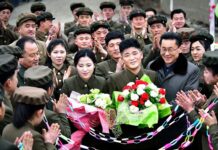Although the North Korean authorities are urging younger people to work at state-run enterprises, such efforts are being rebuffed due to the perceived lack of benefits offered by these workplaces.
Working in the market is generally seen as a more reliable money-earner than the state-run enterprises, which often do not guarantee a regular income at all, let alone enough to survive on. The “market generation” who have managed to stabilize their livelihoods through market activity are said to be ridiculing those who consider working for enterprises.
“Agents with the Samsu County Anti-Socialist Task Force are dropping in on families to probe them on why they aren’t registering at enterprises. People always respond with how commonplace it is, noting how hardpressed one would be to find someone who is actually working at a state-run enterprise,” a source in Ryanggang Province told Daily NK on April 3.
“During the agricultural lean period [currently] people can’t just go to a workplace–they’ve got to work so that they can eat. A lot of people note how grateful the authorities should be that we can feed ourselves and haven’t betrayed the country in the midst of it all.”
The generational gap is said to be most readily apparent in the market sphere. Younger individuals are beginning to associate their livelihoods with entrepreneurship, and are its main drivers. For the youngest of residents, it is all they have ever known.
State-sanctioned repercussions for such views continue to diminish. “Until last year, punishment of the unemployed was very severe,” the source said.
“The Kimilsungist-Kimjongilist Youth League (formerly known as the Kim Il Sung Socialist Youth League) spent a great deal of energy trying to force 20 something-year-olds who were unregistered with a state-run enterprise to write self-critical statements or enlist them in mobilization forces, like the June 18 Shock Brigade (notorious for its backbreaking work in undesirable locations). Now it’s common for officials to be bribed with money or cigarettes in order to avoid such harassment”
But the precarious food situation in certain regions of Ryanggang Province this year has engendered more aggressive responses from these young people toward the harassment meted out by the authorities. “Many people feel they have nothing to lose, so they say ‘why walk on eggshells about it?’”
“With the worsening food situation this year, the younger generation are responding more aggressively, saying, ‘The authorities have never been helpful. We have nothing to lose anymore.’ They are choosing to do business in the markets instead of working for the companies without further consideration,” the source said.
“Everyone knows that the state-run enterprises cannot afford to hire people, so it’s harder for the authorities to punish all of the youth who refuse, like they did in the past.”
This has not gone unnoticed by Kim Jong Un, according to a separate source in Ryanggang Province, who said that the leader called for a “re-examination of, and solution to” the issue of those not registering at official workplaces. The mandate suggests that he is aware of public sentiment among the market generation, and that it may lead to regime insecurity.
A survey on the actual state of employment among the North Korean working generation (aged 20-59) conducted by Korea Development Institute (KDI) in December last year, concluded that North Korea’s unemployment rate was a serious issue. According to the report, written by KDI research Lee Suk, the overall employment rate in North Korea, except Pyongyang, was “at least 31% and at most 62%.”
The report pointed out that contrary to North Korea’s official announcement that the unemployment rate is virtually zero, the actual economic situation is clearly different from these official figures. The extreme divergence in the working population between the official and actual figure is a common phenomenon in almost every region.
As most enterprises and companies have closed down since the widespread famine of the 1990s, a large number of North Koreans are in reality unemployed even though they are registered as employees.
However, unemployment encompasses a different meaning in North Korea than the rest of the world, and only implies that an individual is no longer tethered to a state-run enterprise. This so-called unemployed demographic has largely been absorbed into the market sphere, which is gaining greater momentum. The North Korean people have become accustomed to fending for themselves, and the tendency to prefer the market over company jobs has risen in tandem with the progress of marketization.
“It has been a long time since people began to prefer the market over company work and this situation is not limited to Ryanggang. Most people are doing business in the markets and the younger generation naturally accepts this. These days, people who work for state-run companies are regarded as fools, and those doing well in the markets are considered smart,” the second source said.
“The authorities are constantly issuing instructions and trying to implement measures to reduce the unemployment rate, but there is no solution. Even the regime cannot force people to work for the state without payment, and the state-run companies cannot afford to provide proper rations or salaries.”



















